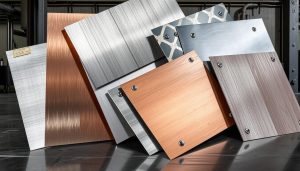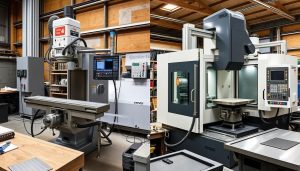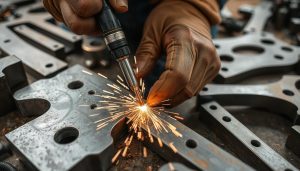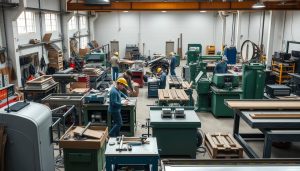Copper is a versatile metal with a long history. It’s crucial in today’s technology and manufacturing. This guide looks at copper’s amazing properties, the different types, and its many uses. Copper is key in fields like electronics, construction, and more because of its great electrical conductivity and resistance to corrosion.
So, what makes copper special? How does its versatility help drive new ideas and progress? Let’s explore the fascinating world of copper together. We’ll discover why this material is so important in our fast-changing world.
Key Takeaways
- Copper is a highly conductive and corrosion-resistant metal with a long history of use in various industries.
- Copper’s unique properties, such as its excellent electrical and thermal conductivity, make it a crucial component in modern technology and infrastructure.
- Copper is available in different forms, including pure copper and copper alloys like brass and bronze, each with its own distinct characteristics and applications.
- Copper is widely used in electrical components, plumbing, construction, and even artistic applications due to its versatility and durability.
- Shixinproto, a leading provider of precision metal fabrication services, offers high-quality copper machining solutions to meet the diverse needs of its clients.
What is Copper?
Copper is a remarkable copper element that has long been prized for its unique metallic properties. This reddish-orange metal, with the symbol Cu and atomic number 29, is a crucial component in a wide range of industries. It’s used in electrical engineering, plumbing, and construction.
Definition and Key Characteristics
Copper is a ductile and malleable metal. It’s known for its exceptional thermal conductivity and electrical conductivity. These properties make it essential in many applications, where heat and electricity transfer is key.
Chemical and Physical Properties
Copper’s chemical and physical properties make it stand out. Its high ductility allows it to be easily shaped and formed. Its resistance to corrosion also makes it durable for outdoor use. Plus, its unique atomic structure and position in the periodic table enhance its performance in various industries.
“Copper’s versatility and superior performance make it an invaluable material in numerous industries, from electrical wiring to plumbing and beyond.”
| Property | Value |
|---|---|
| Atomic Number | 29 |
| Atomic Weight | 63.546 g/mol |
| Melting Point | 1,084.62°C (1,984.32°F) |
| Boiling Point | 2,562°C (4,644°F) |
| Density | 8.96 g/cm³ |
Types of Copper
Copper is a versatile metal found in pure form or as alloys. Knowing the different types of copper and their properties is key. This helps choose the right material for various uses.
Pure Copper vs. Copper Alloys
Pure copper, or electrolytic copper, is the most refined, with 99.9% or more copper. It’s valued for its top-notch electrical and thermal conductivity. This makes it great for electrical wiring, motors, and transformers.
Copper alloys mix copper with elements like zinc, tin, or aluminum. They offer better strength, corrosion resistance, or ease of machining. This makes them useful for different needs.
Common Alloys: Brass and Bronze
Brass and bronze are two common copper alloys. Brass is copper and zinc, with 60-90% copper. It’s known for its golden color, corrosion resistance, and workability. This makes it ideal for decorative items, plumbing, and musical instruments.
Bronze is copper and tin, with 88-92% copper. It’s famous for its strength, durability, and weather resistance. This makes bronze great for sculptures, medals, and architectural features.
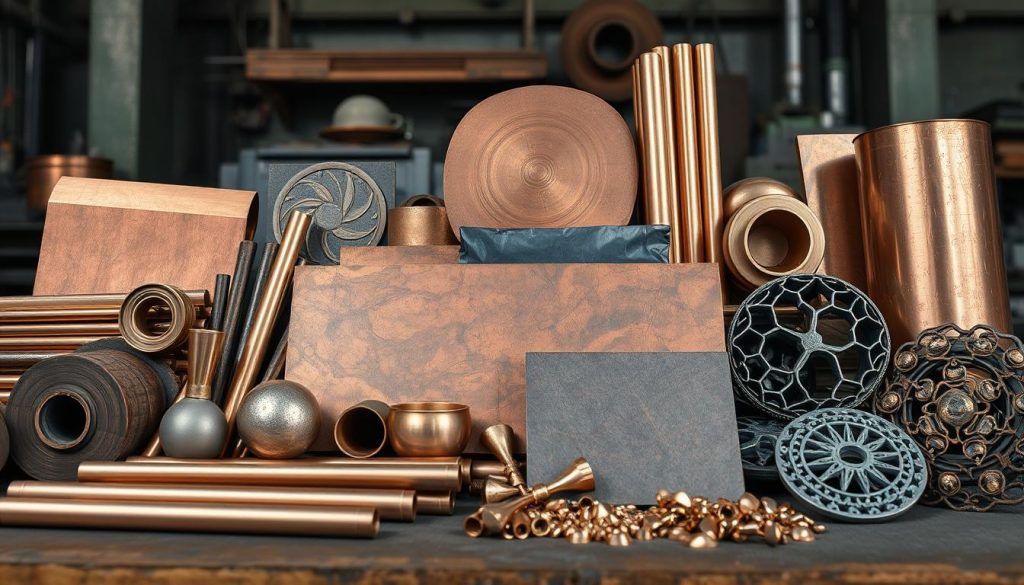
The mix of copper alloys affects their properties, like copper grades, copper purity, and copper alloy compositions. Understanding these variations helps manufacturers and designers pick the best copper material for their projects.
Applications of Copper
Copper is a key material in many areas. It powers our electrical systems and makes plumbing and construction last longer. Its versatility is unmatched.
Electrical Components and Wiring
Copper is great for electrical work because it conducts well. It’s used in homes, businesses, and factories for reliable power. Copper also helps in transformers and motors, keeping our electrical systems running.
Plumbing and Construction
Copper pipes resist corrosion, making them ideal for plumbing. Copper is also strong and durable for construction. It’s used in roofing and other parts of buildings, ensuring they last.
Industrial and Artistic Uses
Copper is not just for electrical and construction work. It’s used in heat exchangers and chemical equipment because of its thermal and corrosion resistance. Its beauty also makes it perfect for copper sculptures and other industrial copper applications.

“Copper’s versatility is unparalleled, from powering our electrical systems to enhancing the durability of plumbing and construction.”
Copper plays a big role in our lives, from keeping our infrastructure working to inspiring art. Its unique qualities keep driving innovation across many industries.
Advantages of Using Copper
Copper is a versatile and highly sought-after material in various industries. Its exceptional electrical conductivity and thermal conductivity make it perfect for electrical components and wiring. Its corrosion resistance and malleability also make it widely used in plumbing, construction, and industrial applications.
Excellent Conductivity
Copper’s electrical conductivity is unmatched by many other metals. This makes it the top choice for electrical wiring, transformers, and electronic devices. Its high thermal conductivity also allows it to efficiently transfer heat. This is why it’s often used in heat sinks, radiators, and other thermal management systems.
Corrosion Resistance and Malleability
Copper naturally forms a protective patina, or oxide layer, on its surface. This makes it highly resistant to corrosion, even in harsh environments. This feature extends the lifespan of copper components, reducing the need for frequent maintenance or replacement. Copper’s malleability and workability also make it easy to shape and mold into various products, from intricate sculptures to essential plumbing and construction materials.
The combination of copper benefits, including its exceptional conductivity, corrosion resistance, and malleability, makes it a versatile and indispensable material. It’s used in countless applications, from everyday electronics to large-scale infrastructure projects.
Shixinproto’s Copper Machining Services
Shixinproto is a top choice for precision copper fabrication. They work with manufacturers and designers in many fields. Their deep knowledge of copper and commitment to quality make them leaders in copper machining.
High-Precision Fabrication for Copper Components
Shixinproto uses the latest CNC machining technology. This allows them to make copper components with great accuracy and detail. Their team can handle complex designs and large parts with ease.
Why Choose Shixinproto for Copper Projects
People choose Shixinproto for their copper needs because of their experience and quality. They have a good track record of delivering on time and within budget. Shixinproto is trusted by many in the electrical, plumbing, industrial, and artistic sectors. They are perfect for any copper project, big or small.
